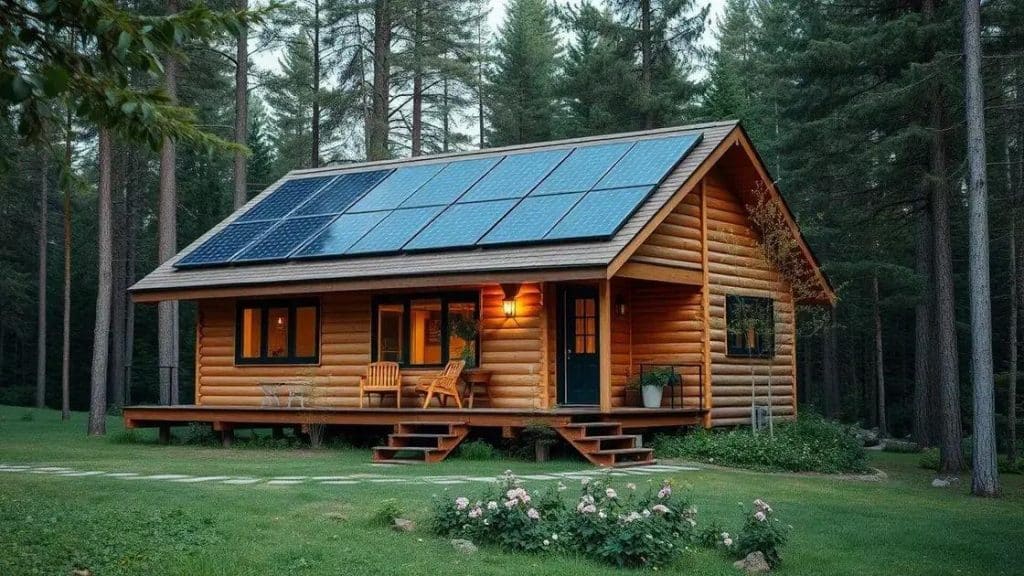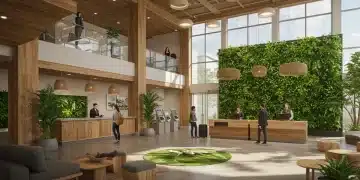Sustainable accommodation options for your next getaway

Sustainable accommodation options reduce environmental impact through eco-friendly practices, support local communities, and offer unique experiences like Earthships and green roof houses.
Sustainable accommodation options are becoming increasingly popular among travelers who value eco-friendliness. Imagine staying in a place that not only offers comfort but also contributes to the environment. Let’s explore some fantastic choices that can enhance your travel experience.
Understanding sustainable accommodation
Understanding sustainable accommodation is vital for those who want to minimize their impact on the environment while traveling. These spaces are designed to reduce energy consumption and promote eco-friendly practices.
What Makes Accommodation Sustainable?
Sustainable accommodation focuses on several key features. First, they often utilize renewable energy sources, such as solar and wind power. This decreases the reliance on fossil fuels.
Key Features of Sustainable Accommodation
- Use of eco-friendly materials in construction
- Water conservation systems
- Recycling programs for waste
- Local sourcing of food and materials
Another important aspect is the location. Many sustainable lodges are situated in natural settings, promoting conservation and allowing travelers to connect with nature. Additionally, they often support local communities by employing local staff and sourcing local products.
Travelers can also make a positive difference by choosing accommodations that prioritize sustainability. These choices encourage higher standards in the hospitality industry, leading to the growth of more environmentally responsible practices.
Moreover, the idea is not just about where you stay but how you travel. Sustainable accommodation encourages visitors to explore the surrounding areas responsibly. This encourages a deeper connection with the environment and culture, which enhances the travel experience.
Overall, understanding sustainable accommodation allows travelers to make informed choices that benefit the planet and local communities. By opting for these eco-friendly options, you take part in a larger movement toward sustainability in the travel industry.
Benefits of eco-friendly lodging

There are many benefits of eco-friendly lodging that travelers should consider. Choosing accommodations that prioritize the environment not only helps the planet but can also enhance your travel experience.
Benefits for the Environment
When you stay at eco-friendly lodges, you contribute to reducing your carbon footprint. These accommodations often implement practices like waste reduction, water conservation, and energy efficiency.
Positive Impact on Local Communities
Eco-friendly lodging frequently supports local economies by sourcing materials and food from nearby vendors. This helps create jobs and encourages sustainable tourism practices.
- Employs local staff
- Promotes local culture and products
- Supports conservation efforts
- Provides education about sustainability
Moreover, eco-friendly accommodations often provide unique experiences. From organic meals to guided eco-tours, guests enjoy a deeper connection to their surroundings. Such experiences can foster greater appreciation for nature and the local community.
Another advantage of these lodgings is their often beautiful and tranquil settings. Many are located in areas rich with wildlife and natural wonders, allowing travelers to immerse themselves in nature.
By choosing eco-friendly options, guests are also often treated to high aesthetics and innovative designs. Sustainable practices can lead to creative architecture and landscaping that not only minimizes impact but also enhances beauty.
How to choose the right sustainable stay
Choosing the right sustainable stay can enhance your travel experience while benefiting the environment. With so many options available, it’s important to know what to look for in eco-friendly accommodations.
Consider Location and Accessibility
Your choice of location matters. Check if the accommodation is near public transportation, allowing you to reduce your carbon footprint. Staying in a place with easy access to local attractions can also minimize the need for a car.
Look for Certifications
Certifications can help guide your decision. Many eco-friendly lodges display certifications from recognized organizations that verify their sustainable practices. Common certifications include:
- Green Key
- LEED (Leadership in Energy and Environmental Design)
- EarthCheck
- Fair Trade Tourism
These certifications ensure that the accommodation meets high environmental standards, giving you peace of mind. It’s also worth checking user reviews to see personal experiences related to sustainability.
Another aspect to consider is the amenities they offer. Does the lodge provide organic food options, use renewable energy, or have water-saving technologies? Such features enhance the sustainable experience and often lead to a healthier stay.
When looking at your options, remember to evaluate the overall impact. Choosing accommodations that give back to local communities or support conservation efforts adds value to your stay.
Innovative examples of sustainable residences

Innovative examples of sustainable residences showcase how creativity meets eco-friendliness. These residences not only reduce environmental footprints but also inspire others to follow suit.
Earthships
One popular example is the Earthship. These homes are built with natural materials and designed to be self-sufficient. They use renewable energy sources and have their own water systems. Earthships promote sustainable living by integrating with the environment.
Green Roof Houses
Another innovative type is a green roof house, which incorporates vegetation on the roof to improve insulation and reduce energy costs. This design helps with rainwater management as well while providing habitats for wildlife.
- Improved air quality
- Energy conservation
- Reduced urban heat island effect
Additionally, tiny homes are gaining popularity for sustainable living. These compact structures minimize the use of materials and energy. Living in a tiny home encourages a simpler lifestyle and efficient use of resources.
Architects are also integrating smart technology into sustainable designs. Smart homes can automatically control energy usage and water consumption, optimizing efficiency. This innovation allows residents to further reduce their environmental impact.
Lastly, modular homes are a great example of sustainability. These homes are prefabricated, which means less waste during construction. They can be easily customized and transported to different locations, making them a flexible option for sustainable living.
FAQ – Frequently Asked Questions about Sustainable Accommodation Options
What are sustainable accommodation options?
Sustainable accommodation options are lodging choices that prioritize eco-friendly practices, such as energy efficiency, water conservation, and support for local communities.
Why should I choose eco-friendly lodging?
Choosing eco-friendly lodging helps reduce your carbon footprint, supports local economies, and promotes conservation efforts, all while providing unique travel experiences.
What types of sustainable accommodations are available?
There are various types of sustainable accommodations, including Earthships, green roof houses, tiny homes, and eco-friendly hotels that use renewable resources.
How can I find certified sustainable lodging?
You can find certified sustainable lodging by looking for green certifications like Green Key, LEED, or EarthCheck, which indicate the use of environmentally responsible practices.





